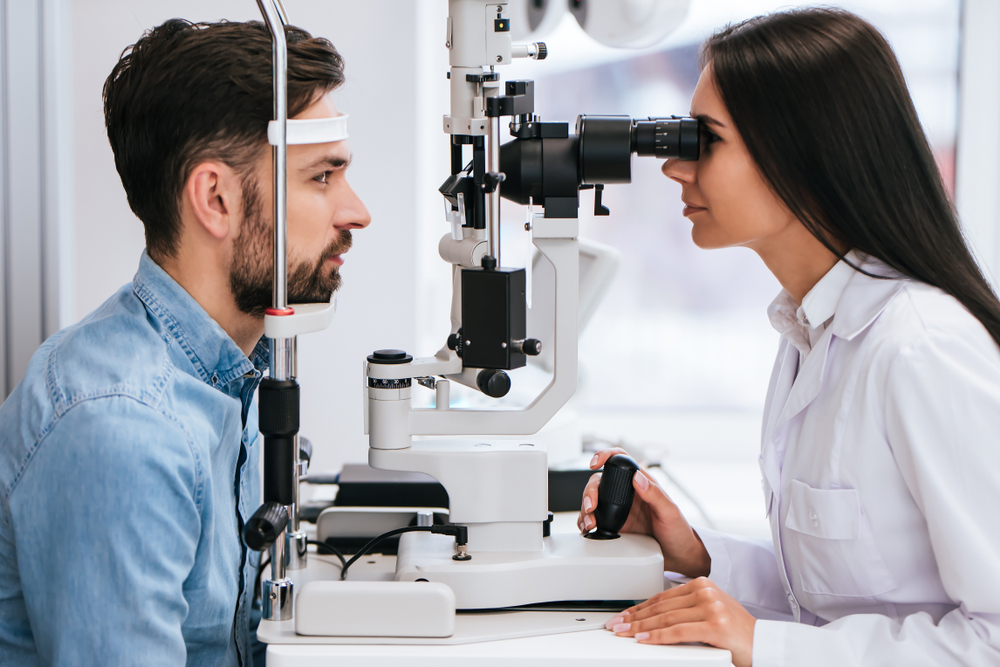Posted by: Associates in Ophthalmology (NJ) in Eye Health

While annual comprehensive eye examinations serve as an excellent baseline for most adults, your personal eye health profile may demand a different schedule entirely. Your age, overall health status, family history, and existing eye conditions all play crucial roles in determining the optimal frequency for your eye examinations.
Learning about why these factors matter can help you make informed decisions about protecting your vision for years to come.
Common Risk Factors for Eye Conditions
The frequency of your eye examinations should align with your specific risk profile for common eye conditions. Several key factors influence how often you should schedule comprehensive eye care visits:
Age
Your age is one of the most significant indicators of appropriate examination frequency. Adults between 18 and 39 years old with no risk factors typically need comprehensive eye examinations at least every two years.
However, once you reach 40, the recommended frequency increases to every two years minimum, with many eye care professionals suggesting annual visits. After age 65, annual comprehensive eye examinations become essential, as aging increases your risk of conditions such as macular degeneration, diabetic retinopathy, and glaucoma, which can develop silently and cause irreversible vision loss if left undetected.
Overall Health
Certain systemic health conditions significantly impact your eye examination schedule. Diabetes is one of the most serious risk factors for vision problems, including diabetic retinopathy, meaning patients with the condition require annual eye examinations regardless of age.
High blood pressure, autoimmune disorders, and thyroid conditions also warrant more frequent monitoring. These conditions can result in ocular complications that require early detection and intervention to prevent permanent damage.
Family History
Your family’s eye health history provides valuable insight into your personal risk profile. Conditions such as glaucoma, macular degeneration, and certain inherited retinal disorders have strong genetic components.
If close family members have experienced these conditions, you may benefit from more frequent examinations and specialized screening tests. Additionally, high refractive errors that run in families often require regular monitoring, particularly in children and young adults whose prescriptions may change rapidly.
Contact Lens Wear
Regular contact lens use increases your risk of eye infections and corneal complications. Annual examinations ensure that your lenses continue to fit properly and that your eyes remain healthy.
The Importance of Regular Eye Examinations
Comprehensive eye examinations serve purposes far beyond updating your glasses or contact lens prescription. These thorough evaluations can detect serious health conditions before symptoms appear, potentially saving your vision and even your life.
For example, glaucoma, often called the “silent thief of sight,” typically causes no pain or noticeable vision changes until significant damage has occurred. Regular eye examinations can detect elevated eye pressure and optic nerve changes long before you notice any vision problems.
Similarly, macular degeneration may begin affecting your central vision gradually, making it difficult to recognize until the condition has advanced. Comprehensive examinations can identify early signs of macular changes, allowing for interventions that may slow progression.
Your eyes also provide a unique window into your overall health status. During a comprehensive examination, eye care professionals can detect signs of diabetes, high blood pressure, autoimmune diseases, and even certain types of cancer.
The blood vessels and tissues in your eyes often show changes related to systemic conditions before symptoms appear elsewhere in your body. This makes regular eye examinations an essential component of your overall preventive healthcare routine, complementing your regular medical check-ups.
Taking Action for Your Vision Health
Your vision is one of your most valuable assets, and protecting it requires proactive care tailored to your individual needs. While yearly eye examinations provide excellent protection for many people, your personal circumstances may require a different approach.
Associates in Ophthalmology works with each patient to develop personalized examination schedules that address their unique risk factors and vision needs. Schedule a comprehensive eye examination at Associates in Ophthalmology in Livingston, NJ, today to discuss your individual risk factors and establish the best care schedule for protecting your vision.

